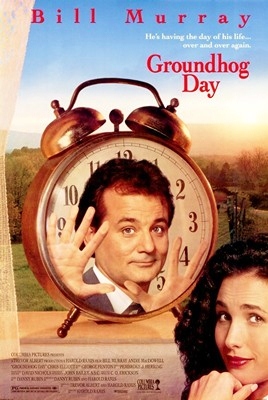I've been having a Harold Ramis retrospective since hearing the hard news that he passed away. I saved the best picture to watch last. I'm talking about Groundhog Day.
After seeing Groundhog Day, and being both entertained and moved once again, I turned to the net to do some research on the movie. I was saddened to learn that Bill Murray and Harold Ramis fought bitterly during the production, and that they never really mended the problem between them.
The reason for it is supposedly because Murray wanted to focus on the serious aspects of Groundhog day, and Ramis wanted to keep it in a more comedic direction.
I'm sure there was more to it than merely that. Longtime collaborators often develop animosity toward one another. It's a sad element of human nature.
I can see both sides of the argument. Despite its breezy tone, there is a definite morality story inside Groundhog Day. I think more people realize it with repeat viewings. For instance, Roger Ebert initially gave Groundhog Day three out of four stars in his review upon its original release. Not such a bad rating, but he later revised his opinion in 2005 and listed Groundhog Day as part of his list of Great Movies.
Still, it's not hard to imagine Bill Murray's frustration. He often strove to be taken more seriously as an actor. Unfortunately few wanted to see him in his dream project: an adaptation/remake of Somerset Mougham's The Razors Edge. I, on the other hand, cite it as a favorite.
But it's also very easy to see Harold Ramis's side. He always was a comedy guy, and he probably felt that it was his job to deliver a successful comedy picture to his producers. He achieved that. Groundhog day was not a hit of the caliber of Ghostbusters or Animal House, but it did respectable box office.
Perhaps if Bill Murray had his say, Groundhog Day may well have been a better motion picture. Maybe. We'll never know the answer to that question.
However, Groundhog Day remains one of the most beloved movies of all time. It gradually sank its way into public consciousness. I have found that the faces of people light up when the title is mentioned. Buddhists have embraced Groundhog Day. In 2006 Groundhog Day was entered into the United States National Film Registry for its cultural, historical, or aesthetic significance.
The real tragedy of the story of a man condemned to relive a frustrating day over and over again is this: Bill Murray and Harold Ramis never worked together again. Rumor has it that Ramis wanted Murray to be in his comic crime feature, The Ice Harvest, but the actor declined. We are all poorer for this.
Murray and Ramis made comic gold together, and never more so than in Groundhog Day. This is a movie that will not only entertain, but it will also uplift you, and if you allow your heart and soul to accept its sweet message, it will make you a better, richer person.
After seeing Groundhog Day, and being both entertained and moved once again, I turned to the net to do some research on the movie. I was saddened to learn that Bill Murray and Harold Ramis fought bitterly during the production, and that they never really mended the problem between them.
The reason for it is supposedly because Murray wanted to focus on the serious aspects of Groundhog day, and Ramis wanted to keep it in a more comedic direction.
I'm sure there was more to it than merely that. Longtime collaborators often develop animosity toward one another. It's a sad element of human nature.
I can see both sides of the argument. Despite its breezy tone, there is a definite morality story inside Groundhog Day. I think more people realize it with repeat viewings. For instance, Roger Ebert initially gave Groundhog Day three out of four stars in his review upon its original release. Not such a bad rating, but he later revised his opinion in 2005 and listed Groundhog Day as part of his list of Great Movies.

Still, it's not hard to imagine Bill Murray's frustration. He often strove to be taken more seriously as an actor. Unfortunately few wanted to see him in his dream project: an adaptation/remake of Somerset Mougham's The Razors Edge. I, on the other hand, cite it as a favorite.
But it's also very easy to see Harold Ramis's side. He always was a comedy guy, and he probably felt that it was his job to deliver a successful comedy picture to his producers. He achieved that. Groundhog day was not a hit of the caliber of Ghostbusters or Animal House, but it did respectable box office.
Perhaps if Bill Murray had his say, Groundhog Day may well have been a better motion picture. Maybe. We'll never know the answer to that question.
However, Groundhog Day remains one of the most beloved movies of all time. It gradually sank its way into public consciousness. I have found that the faces of people light up when the title is mentioned. Buddhists have embraced Groundhog Day. In 2006 Groundhog Day was entered into the United States National Film Registry for its cultural, historical, or aesthetic significance.
The real tragedy of the story of a man condemned to relive a frustrating day over and over again is this: Bill Murray and Harold Ramis never worked together again. Rumor has it that Ramis wanted Murray to be in his comic crime feature, The Ice Harvest, but the actor declined. We are all poorer for this.
Murray and Ramis made comic gold together, and never more so than in Groundhog Day. This is a movie that will not only entertain, but it will also uplift you, and if you allow your heart and soul to accept its sweet message, it will make you a better, richer person.
The author does not allow comments to this entry
No comments